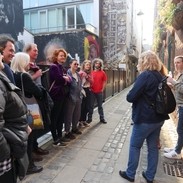Product safety
West Midlands Growth Company

Disclaimer
Disclaimer: While every effort has been made to ensure the accuracy of the information contained in the Pink Book, we regret that we cannot be responsible for any errors. The Pink Book contains general information about laws applicable to your business. The information is not advice and should not be treated as such. Read our full disclaimer.
Key facts
Operators of all domestic, residential and sleeping accommodation have a responsibility to ensure that gas appliances and flues in the premises are safely maintained and checked. All safety checks must be carried out by a Gas Safe registered engineer.
Electrical equipment safety regulations require that all electrical equipment supplied ‘in the course of business’ is safe. There is no specific requirement for annual maintenance, but to ensure electrical equipment remains safe, you should have it checked and serviced regularly by a registered electrician.
The essential requirements are to ensure that you supply only safe products to your customers, and to ensure that a product remains safe throughout its period of use. The general product safety regulations also apply if you provide self-catering accommodation.
Gas safety
Installing and maintaining gas appliances
Each year there are fatalities from carbon monoxide poisoning caused by poorly installed or badly maintained gas boilers, appliances and flues – as well as complaints from guests about the safety of gas appliances provided in accommodation premises. The Gas Safety (Installation and Use) Regulations 1998 are there to protect your staff and your customers.
They supplement any responsibilities you may have under the Health and Safety at Work, etc Act 1974 and the Management of Health and Safety at Work Regulations 1999.
Registration schemes for gas engineers
The CORGI registration scheme for gas engineers ended on 1 April 2009 and has been replaced by the Gas Safe registration scheme. It is illegal for any engineer to undertake work under the Gas Safety (Installation and Use) Regulations 1998 unless they are Gas Safe registered.
What do the gas safety regulations cover?
The regulations specifically deal with the installation, maintenance and use of gas appliances and fittings and flues in domestic, residential and commercial premises.
The regulations place duties on a wide range of people, including gas suppliers and those installing and working on gas equipment.
The regulations include extensive duties on business operators for ensuring appliances and flues in their premises are safely maintained and checked.
What types of premises are affected?
The premises affected include all attractions and tourist accommodation including:
Commercial installations generally;
Self-catering properties;
Hotels, guesthouses, hostels and bed and breakfasts;
Permanently sited caravans;
Touring caravans and inland waterway boats hired out in the course of business.
What are my main duties?
Duties as a business operator
You are required to:
Ensure all gas fittings and flues are maintained in a safe condition.
Ensure an annual safety check is carried out on each gas appliance/flue by a Gas Safe registered engineer (see Registration schemes for gas engineers, above, for more details).
Keep a written record of the inspection for two years, containing information such as the following:
o The date of the check;
o Location and details of the appliance/flue;
o Any defects found and action taken;
o A confirmation that the check was made in accordance with the regulations.
Issue a copy of the record to any person staying for more than 28 days – or if the premises is let for 28 days or less, display a copy of the record prominently in the premises.
Duties as an employer
You have a duty to ensure that gas appliances under your control are ‘maintained in a safe condition so as to prevent injury to any person’. This includes staff or people that you contract to work on your premises (such as security guards and cleaners).
Other important provisions
Other important provisions include the following:
Anyone carrying out work on gas appliances or fittings not as part of their business (for example as a favour to you) must still be competent. Do-it-yourself work can be dangerous and illegal.
Note: employers can only use Gas Safe engineers (see Registration schemes, above, for more details).
You must not use any gas appliance or fitting that you know or suspect to be unsafe.
With the exception of ‘room-sealed’ appliances, there are restrictions on the installation of gas appliances in sleeping areas fitted after 1 January 1996.
It is illegal to install instantaneous water heaters that are not room-sealed or fitted with a safety device which automatically turns off the gas supply before a dangerous level of poisonous fumes builds up.
Additional precautions
The Health and Safety Executive highlights additional precautions:
Whenever draught exclusion, double glazing or a conservatory extension is fitted to a room containing a gas appliance, the appliance should subsequently be checked for safety.
Never block or obstruct any fixed ventilation grilles or air bricks.
Never block or cover outside flues.
While there is no legal requirement to install a carbon monoxide detector, their use is a requirement of the VisitEngland National Quality Assessment Scheme, and is considered best practice for properties which have a gas supply.
Your liabilities and those of your agent or landlord
IMPORTANT: if you use an agent to manage your properties (for example self-catering accommodation) or you rent your premises, you should ensure that the management contract or rental agreement specifies who is responsible for the maintenance of gas appliances and for keeping records to indicate when this maintenance has been carried out.
The liability of purely marketing and booking agencies (rather than management agencies) under these regulations is unclear. Some agencies therefore seek to exclude themselves from liability by inserting into their contracts with owners a clause which commits those owners to ensuring that their property complies at all times with the gas safety requirements.
Gas BBQs and outdoor appliances
Under the regulations, the term ‘gas appliance’ does not include portable or mobile appliances supplied with gas from a cylinder, or the cylinder, pipes and other fittings used for supplying gas to that appliance. As such, you are not legally required to have appliances such as gas BBQs or outdoor heaters Gas Safe tested.
However, these appliances would need to be included in your health and safety assessment of your premises, and therefore you would need to undertake periodic checks of the connections, pipes and fittings to ensure that they were safe. This does not need to be by someone who is Gas Safe registered, but if you had other gas appliances that needed checking, it would make sense to ask your Gas Safe engineer to also check these appliances while they are on the premises.
Electrical equipment
What do the regulations cover?
The Electrical Equipment (Safety) Regulations 1994 require, among other things, that all electrical equipment supplied ‘in the course of business’ is safe. This applies equally to new and second-hand equipment.
Do the regulations apply to me?
The regulations apply to everyone who supplies electrical equipment to customers in the course of their business, regardless of whether or not their business is actually the supply of electrical equipment. The regulations are particularly relevant to self-catering accommodation, as equipment in these premises may not be covered by the Electricity at Work Regulations, which covers fixtures and fitting on the premises (see the Hazards in the workplace section for more details).
What does safe mean?
For electrical equipment to be regarded as safe, there should be no risk (or only a minimal risk) that the equipment will in any way cause death or injury to any person or domestic animal, or cause damage to property.
If you are buying any new electrical equipment in the UK, it should be ‘safe’ as manufacturers and suppliers are bound by the same regulations. As a result of the UK leaving the EU, it is now a requirement that, from 31 December 2022, all new electrical products placed on the UK market carry the UK Conformity Assessed (UKCA) mark rather than the previous EU CE mark. However, you can continue to use CE marked products and purchase and use second hand products that have the CE mark after this period.
Do I need to maintain electrical equipment?
Although these regulations require electrical equipment to be safe, unlike for gas appliances there is no specific requirement for annual maintenance. However, to be sure that the electrical equipment in your business remains safe, you should have it checked and serviced regularly by a registered electrician.
You should also note that you are legally required to undertake a Health and Safety Risk Assessment under the Management of Health and Safety at Work Regulations 1999, where you are required to identify hazards that could cause injury to employees or customers and take action to eliminate or minimise the risk. Scheduling regular PAT testing of electrical equipment on your premises would therefore demonstrate that you are fulfilling your legal obligations under both the Electrical Equipment (Safety) Regulations and the Management of Health and Safety at Work Regulations. The frequency of the testing should be based on the age and risk posed by the electrical appliance.
The Health and Safety Executive (HSE) provides a free guidance publication – Electrical Safety and You – which contains useful information about checking electrical equipment.
Note: letting agents and landlords can also be held responsible for the safety of the electrical equipment in premises that they let or rent, depending on the terms of their management or rental agreements. Check your agreement and speak with your agent/landlord to ensure that you both understand who is responsible for the safety of electrical products.
General product safety
The General Product Safety Regulations 2005 are designed to ensure that all products supplied to customers are safe in their normal or reasonably foreseeable usage.
The regulations cover products that are made available to consumers for their use in the course of a delivery of a service (for example the provision of a hairdryer in a hotel room, a riding helmet provided to someone pony trekking, or a cot for customers who have a baby).
Where a product is already subject to other existing regulations, those regulations will still apply to that product. The General Product Safety Regulations 2005 will also apply wherever they go further than the existing regulations.
Do the regulations apply to me?
Yes: if you are providing equipment for the use of customers.
Note: letting agents can be held responsible for product safety in self-catering accommodation, depending on the terms of their agreement with the property owners.
How do I comply with the regulations?
The essential requirements are to ensure that you supply only safe products to your customers, and take steps (where appropriate) to help ensure that a product remains safe throughout its period of use.
A safe product is defined as: ‘any product which under normal or reasonably foreseeable conditions of use presents no risk or only the minimum risk compatible with the product’s use and which is consistent with a high level of protection for consumers’.
You are required to provide customers with all relevant information, warnings and instructions for the safe operation and use of products. You are also required to keep yourself informed about possible risks.
General precautions
The regulations require no formal testing of products and, as you can see from the examples below, it is really just a matter of common sense and routine checking:
If instructions are needed to operate a piece of equipment, ensure that they are provided.
If a piece of equipment provided is damaged, it should be repaired – for example an ironing board with loose or fragile legs.
If an item of furniture or equipment can be damaged and made dangerous, ensure your customers know this.
Requirements as a ‘distributor’ of products
As a ‘distributor’ of products you are also required, ‘within the limits of your activity’, to participate in monitoring the safety of products that you supply, and to pass on information about product risks. In practice this means:
Passing on to customers information provided by producers about a product’s risks.
Passing back to producers’ safety complaints, information and experiences on safety-related matters obtained from customers.
Cooperating with the authorities and others in the supply chain in taking action to avoid or remove those risks.
Note: if you discover that you have provided an unsafe product for your customers to use, you should notify your local authority of the fact and what action you have taken to remove the risks to your customers.
Enforcement
The Trading Standards department of your local authority is responsible for enforcing the regulations mentioned above (except for the Electrical Equipment (Safety) Regulations 1994).
Further guidance
Gas safety
Visit the Gas Safe Register website or call the gas safety advice line on 0800 300 363.
Checking gas appliances
You can download Gas Appliances. Get Them Checked, Keep Them Safe from the HSE website.
Carbon Monoxide guidance
Guidance from United Against Carbon Monoxide on the correct installation of alarms and recommended products can be found on its website.
Your duty as a landlord
You can download Landlords, A Guide to Landlords’ Duties: Gas Safety (Installation and Use) from the HSE website.
Brief guide to electrical safety
You can download Electrical safety and you: A brief guide from the HSE website.
Contact your Local Authority
Advice is available from the Trading Standards department of your local authority, which enforces most of the regulations.
General product safety
You can download the Chartered Trading Standards Institute guidance on general product safety in rented accommodation from the Business Companion website.







